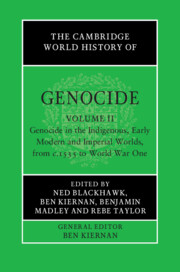Book contents
- The Cambridge World History of Genocide
- The Cambridge World History of Genocide
- The Cambridge World History of Genocide
- Copyright page
- Contents
- Figures
- Maps
- Tables
- Contributors to Volume ii
- Introduction to Volume ii
- Part I Settler Colonialism
- Part II Empire-Building and State Domination
- 4 A Case Lacking Contemporaneous Local Sources
- 5 Atrocity and Genocide in Japan’s Invasion of Korea, 1592–1598
- 6 The English Conquest of Ireland, c.1530–c.1650
- 7 Extirpation and Annihilation in Cromwellian Ireland
- 8 Genocide in the Spice Islands
- 9 ‘Too Furious’
- 10 The Destruction of Wendake (Huronia), 1647–1652
- 11 A ‘Spreading Fire’
- 12 The Qing Extermination of the Zünghars
- 13 A Vicious Civil War in the French Revolution
- 14 The Zulu Kingdom as a Genocidal and Post-genocidal Society, c.1810 to the Present
- Part III Nineteenth-Century Frontier Genocides
- Part IV Premonitions
- Index
14 - The Zulu Kingdom as a Genocidal and Post-genocidal Society, c.1810 to the Present
from Part II - Empire-Building and State Domination
Published online by Cambridge University Press: 23 June 2023
- The Cambridge World History of Genocide
- The Cambridge World History of Genocide
- The Cambridge World History of Genocide
- Copyright page
- Contents
- Figures
- Maps
- Tables
- Contributors to Volume ii
- Introduction to Volume ii
- Part I Settler Colonialism
- Part II Empire-Building and State Domination
- 4 A Case Lacking Contemporaneous Local Sources
- 5 Atrocity and Genocide in Japan’s Invasion of Korea, 1592–1598
- 6 The English Conquest of Ireland, c.1530–c.1650
- 7 Extirpation and Annihilation in Cromwellian Ireland
- 8 Genocide in the Spice Islands
- 9 ‘Too Furious’
- 10 The Destruction of Wendake (Huronia), 1647–1652
- 11 A ‘Spreading Fire’
- 12 The Qing Extermination of the Zünghars
- 13 A Vicious Civil War in the French Revolution
- 14 The Zulu Kingdom as a Genocidal and Post-genocidal Society, c.1810 to the Present
- Part III Nineteenth-Century Frontier Genocides
- Part IV Premonitions
- Index
Summary
White people have all too often stereotyped African leaders as bloodthirsty and barbarous, and none more than the Zulu kings. Nevertheless, a substantial body of reliable evidence and the consensus judgement of historians shows that, in the early 1800s, the Zulu kings Shaka and Dingane perpetrated the widespread of killing of innocent civilians as they tried to establish and maintain the Zulu kingdom. It is the contention of this chapter that these killings fit the definition of genocide under international law. However, today the Zulu people include the descendants of both perpetrators and victims of this genocide, and memories of this violence are suppressed or minimized. Despite this history of genocide, Zulu unity has proved to be a popular tool in the fight against colonialism and apartheid.
- Type
- Chapter
- Information
- The Cambridge World History of Genocide , pp. 335 - 358Publisher: Cambridge University PressPrint publication year: 2023

